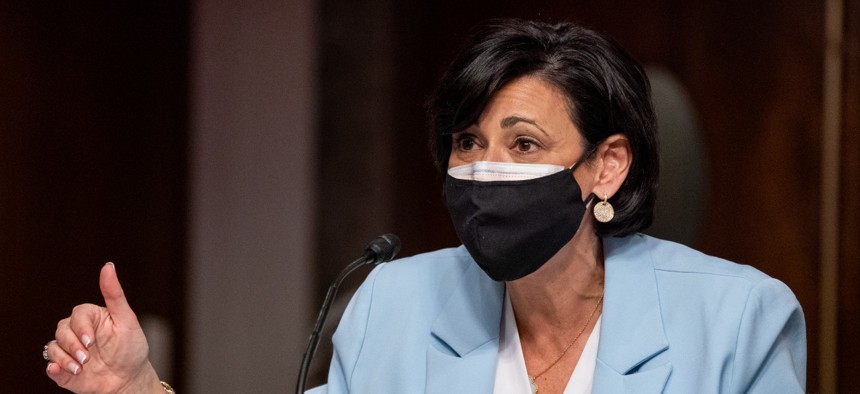
Dr. Rochelle Walensky, director of the Centers for Disease Control and Prevention, testifies on Capitol Hill in January. Shawn Thew-Pool/Getty Images
Coronavirus Roundup: A New CDC Center Is Focused on Disease Forecasting
There’s a lot to keep track of. Here’s a list of this week’s news updates and stories you may have missed.
The Centers for Disease Control and Prevention officially launched on Tuesday a new Center for Forecasting and Outbreak Analytics, which has been in the works since August 2021, with initial funding of $200 million from the American Rescue Plan.
The center “seeks to enhance the nation’s ability to use data, models and analytics to enable timely, effective decision-making in response to public health threats for CDC and its public health partners,” said a press release. Additionally, “to better inform our partners, [the center] is hiring expert communicators to regularly share insights with federal, state and local partners and the public.” Here are some of the other recent headlines you might have missed.
There were pitfalls in how Immigration and Customs Enforcement and Endeavors (a nonprofit, faith-based organization it contracted with for beds and hotel services from March 2021 to September) tested migrants for COVID-19 as well as how healthcare protocols were followed in facilities, said a new report from the Homeland Security Department inspector general. “Overall, the lapse in compliance with the new healthcare protocols demonstrates that migrant families at Endeavors’ facilities may not have received timely COVID-19 testing to prevent the spread of COVID-19, and medical staff may not have provided the level of medical care intended by the protocols,” said the report.
The Federal Emergency Management Agency’s COVID funeral assistance program operates in a way that is “inconsistent” from its long-standing regulations, said a recent management alert from the DHS inspector general. FEMA did not agree with the IG’s recommendation to modify procedures after reviewing a draft alert.
The Justice Department announced on Wednesday criminal charges against 21 defendants in nine federal districts for alleged participation in several COVID health care related fraud schemes. “These cases allegedly resulted in over $149 million in COVID-19-related false billings to federal programs and theft from federally-funded pandemic assistance programs,” said the department. “In connection with the enforcement action, the department seized over $8 million in cash and other fraud proceeds.” In addition to Justice officials, federal law enforcement partners, inspectors general offices and others worked on these cases.
DHS is extending its requirements for non-U.S. citizens traveling through land ports of entry and ferry terminals at the borders with Mexico and Canada to be fully vaccinated and show proof of vaccination if asked. “DHS will closely monitor all relevant circumstances, including the effect of these requirements, and may amend or rescind the requirements at any time,” said a press release from the agency on Thursday. “In determining whether and when to rescind this order, DHS anticipates that it will take account of whether the vaccination requirement for non-U.S. air travelers remains in place.”
After a 41% decline in consular fee revenue in fiscal 2020 due to the pandemic, the State Department’s Bureau of Consular Affairs, which issues passports and visas and provides overseas citizens services, could face serious financial issues. “Consular fee revenues fully covered the costs of State’s consular operations for seven fiscal years prior to the COVID-19 pandemic, and the use of supplemental and annual appropriations and temporary flexibilities in fee expenditure authorities helped State address the decline in consular fee revenue during the pandemic,” said a GAO report published on Monday. However, the department continues to face a “structural imbalance” in how funds are handled that was exacerbated by the pandemic. Also, “our analysis projects that [the Consular and Border Security Program] account carryover balances will decline and are unlikely to meet the targeted threshold if revenues do not return to pre-pandemic levels in fiscal year 2022.”
In preparation for the lifting of Title 42, a public health measure to restrict border access during the pandemic, in late May, the Homeland Security Department is “implementing a comprehensive strategy to address a potential increase in the number of border encounters,” said Karine Jean Pierre, White House principal deputy press secretary, during a press gaggle on Thursday. “Their strategy includes acquiring and deploying resources to address increased volumes; that involves moving officers, agents, DHS Volunteer Force personnel to rapidly decompress points along the border and more efficiently process migrants,” she continued. “It also entails the deployment of COVID-19 mitigation efforts, including the continued use of [personal protective equipment] and providing the COVID-19 vaccines to non-citizens in ICE custody since summer of 2021.”
Title 42 has been a controversial matter since it was implemented under President Trump. Now an increasing number of Democrats want it to stay in place and several Republican-led states are suing the Biden administration to prevent it from being terminated. Also, Senate Republicans, and some Democratic ones, have tried to use the COVID-19 funding negotiations as a way to keep Title 42 in effect.
Dr. Rochelle Walensky, CDC director, said in a video that last week she welcomed CDC employees back to the workplace. “Over the past several years CDC has shown a tremendous amount of resilience responding to the greatest public health challenge in our agency’s history while simultaneously living through the pandemic themselves,” she said. “As CDC returns to the workplace, we are also taking a critical look at CDC, our response to the COVID-19 pandemic and how we move forward and do better to protect the health of the American people.”
For the Justice Department workforce, the number of in-person work days will vary based on positions, Bloomberg Law reported on Thursday. The department seeks to complete its return to office plans by May 1.
Help us understand the situation better. Are you a federal employee, contractor or military member with information, concerns, etc. about how your agency is handling the coronavirus? Email us at newstips@govexec.com.
NEXT STORY: Small Towns Drew Most New Pandemic Residents







